When the New York Post dropped its bombshell reporting on documents recovered from Hunter Biden’s abandoned laptop in October of 2020, Twitter did not reach out to the FBI to ask whether the reporting was Russian disinformation — despite extensive coordination with the FBI to prepare to combat foreign election interference. Instead, according to testimony at Wednesday’s House Oversight Committee hearing, Twitter relied on the tweets of supposed experts, making the tech giant’s decision to censor the Post’s story even more outrageous.
The House Oversight Committee, now in the hands of Republicans, questioned four former Twitter executives on their decision to censor the Hunter Biden laptop story. Rep. Andy Biggs, R-Ariz., pushed Twitter’s former global head of trust and safety, Yoel Roth, to explain the timing of Twitter’s decision to censor the New York Post story.
Biggs noted that in an 8:51 a.m. email on Oct. 14, 2020, Roth had taken the position that the laptop “isn’t clearly violative of our Hacked Materials Policy.” But then, by 10:12, Roth emailed his colleagues with Twitter’s decision to censor the story, stating that “the key factor informing our approach is consensus from experts monitoring election security and disinformation that this looks a lot like a hack-and-leak operation.”
What cybersecurity experts had Roth consulted between 9 a.m. and 10:15 a.m. on Oct. 14, 2020, the morning the Post story broke, Biggs asked the former Twitter executive.
Roth responded that the experts were ones the Twitter heads were following on the platform. “We were following discussions about this as they unfolded on Twitter,” Roth explained. “Cybersecurity experts were tweeting about this incident and sharing their perspectives, and that informed some of Twitter’s judgment here.”
Rep. Kelly Armstrong, R-N.D., was incredulous: “After 2016, you set up all these teams to deal with Russian interference, foreign interference, having regular meetings with the FBI, you have connections with all of these different government agencies, and you didn’t reach out to them once?”
“That’s right,” Roth said, noting he didn’t think it would be appropriate.
Instead, Twitter relied on the tweets of supposed national security experts.
Who those experts were, Roth didn’t say, but here we have another strange coincidence: In his testimony on Wednesday, Roth told the committee that a few weeks before the Post story dropped, he had participated in an exercise hosted by the Aspen Institute, with other media outlets and social media companies, that posed a hack and leak October surprise involving Hunter Biden. Roth testified that Garrett Graff facilitated that event.
And at 8:23 a.m. on Oct. 14, 2020, after the Post story broke, Graff tweeted his playbook for how the media should react to “this Biden-Burisma crap.”
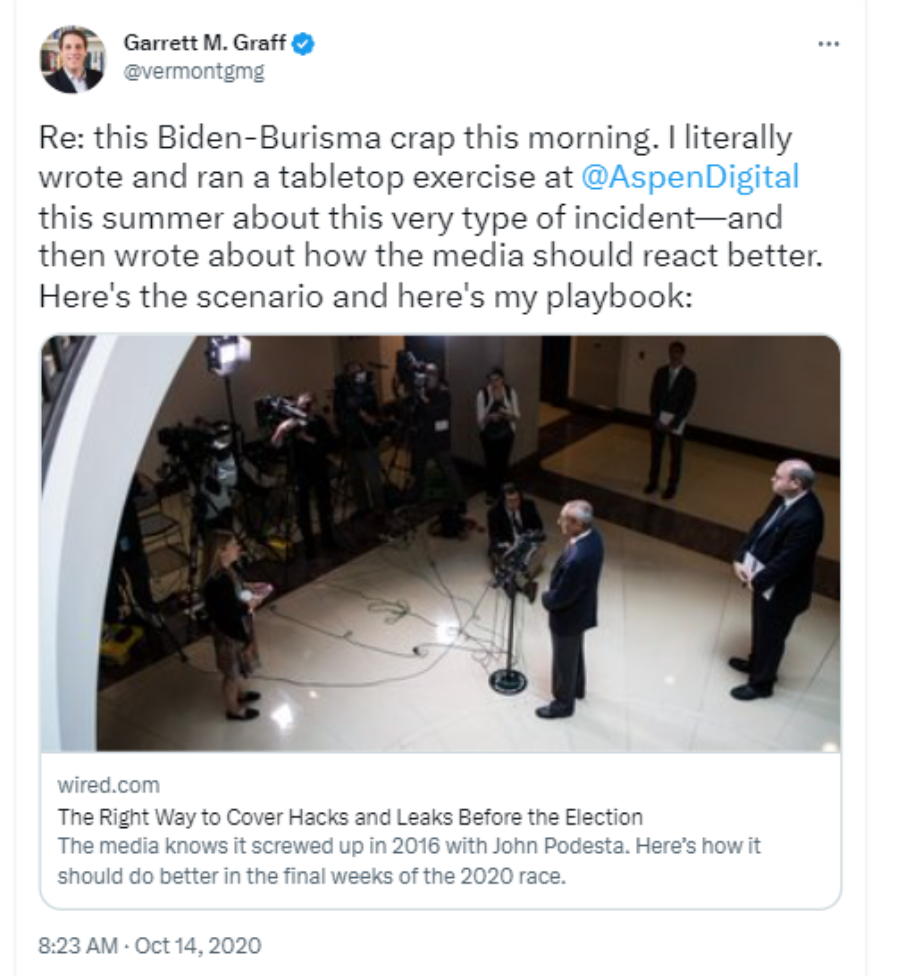
Graff followed about some 10 minutes later, tweeting, “Also, what a TOTAL coincidence that this fake Hunter Biden scandal drops the literal day after it becomes clear that both of Bill Barr’s other intended October surprises—the Durham investigation and the unmasking investigation—have fallen apart??!”
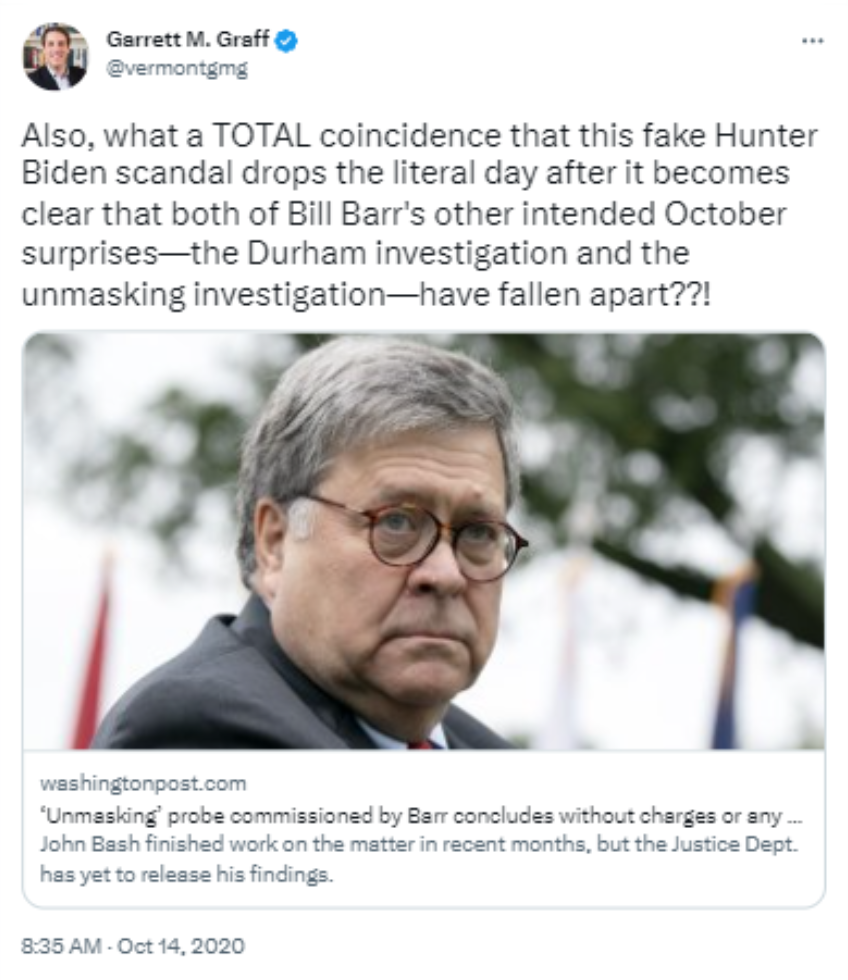
Not long after Graff began pushing the “fake” Hunter Biden scandal narrative, Vivian Schiller joined in, calling the Hunter Biden story “nonsense” and claiming Graff’s exercise was “to test readiness of some MSM.”
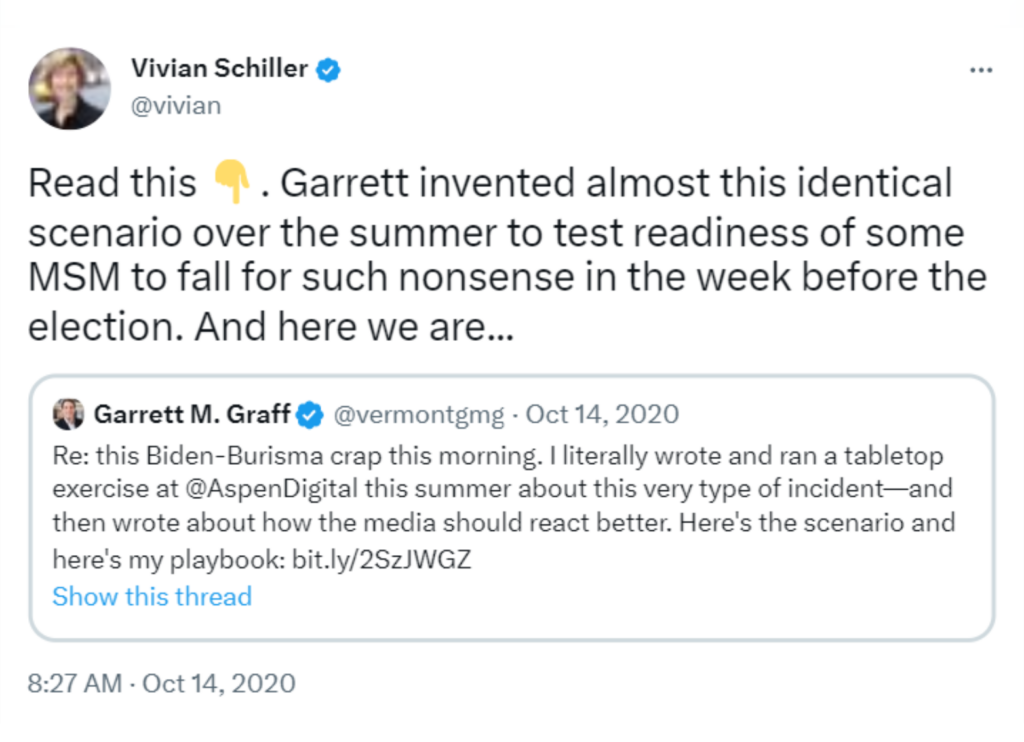
And who is Schiller? According to Graff, Schiller “designed and ran” the Hunter Biden tabletop exercise that Roth participated in. She was also the former head of news at Twitter, in addition to previously being the CEO of NPR, among other gigs.
In addition to Graff and Schiller, CNN’s consultant and so-called national-security expert weighed in at 8:23 a.m., questioning the “amplifying” of the New York Post’s story, stressing that “amplification is the key to disinformation.”
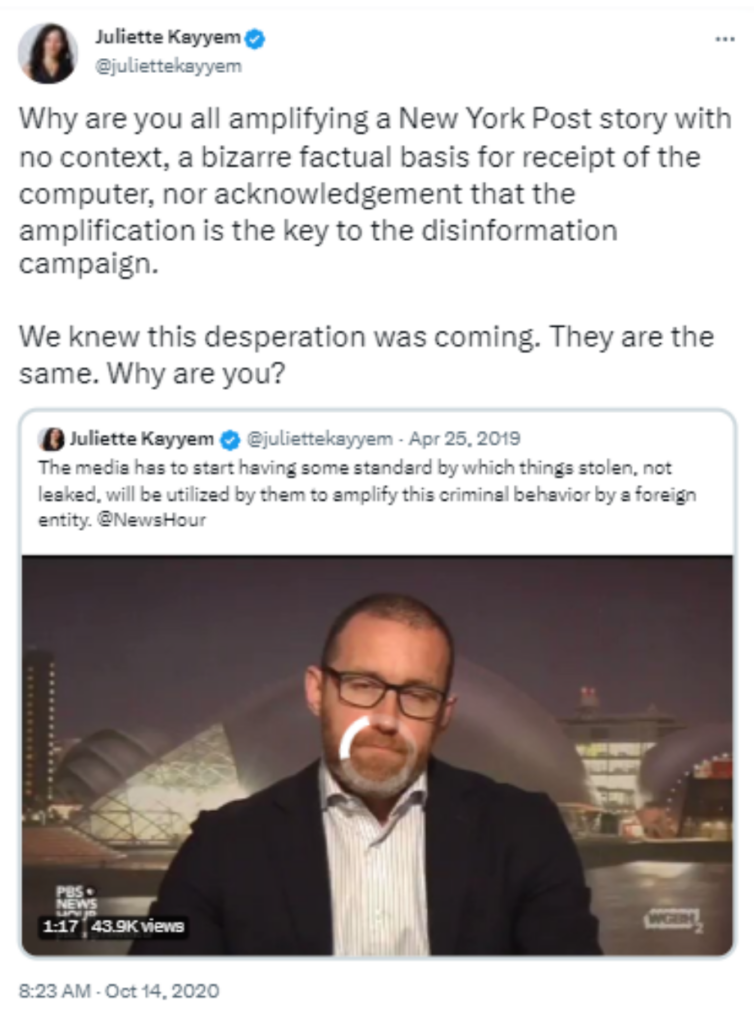
Natasha Bertrand also tweeted an early morning “warning” that a Russian agent had been “teasing misleading or edited Biden material for nearly a year.”
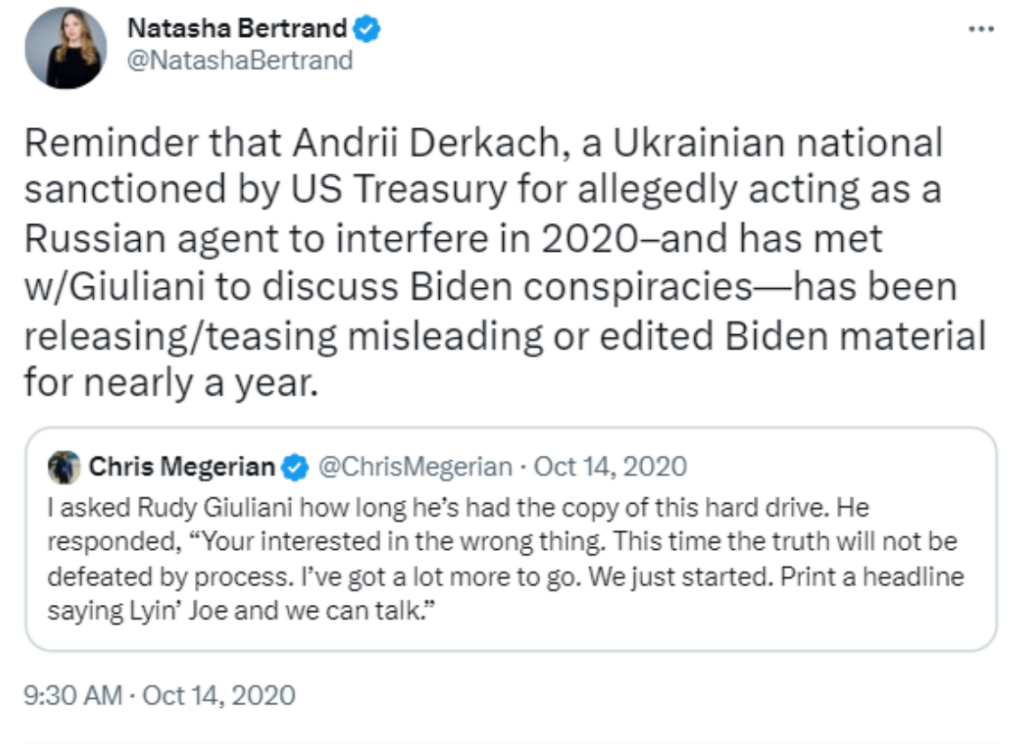
Bertrand, also known as Fusion Natasha for falling for Fusion GPS’s Steele dossier and Alfa Bank hoax, was joined in pushing the disinformation narrative by The Washington Post’s alleged fact-checker Glenn Kessler.
By 8:30 a.m., Kessler had shared The Washington Post’s policy “regarding hacked or leaked materials,” and told Twitter users to “be careful what is in your social media feeds.”
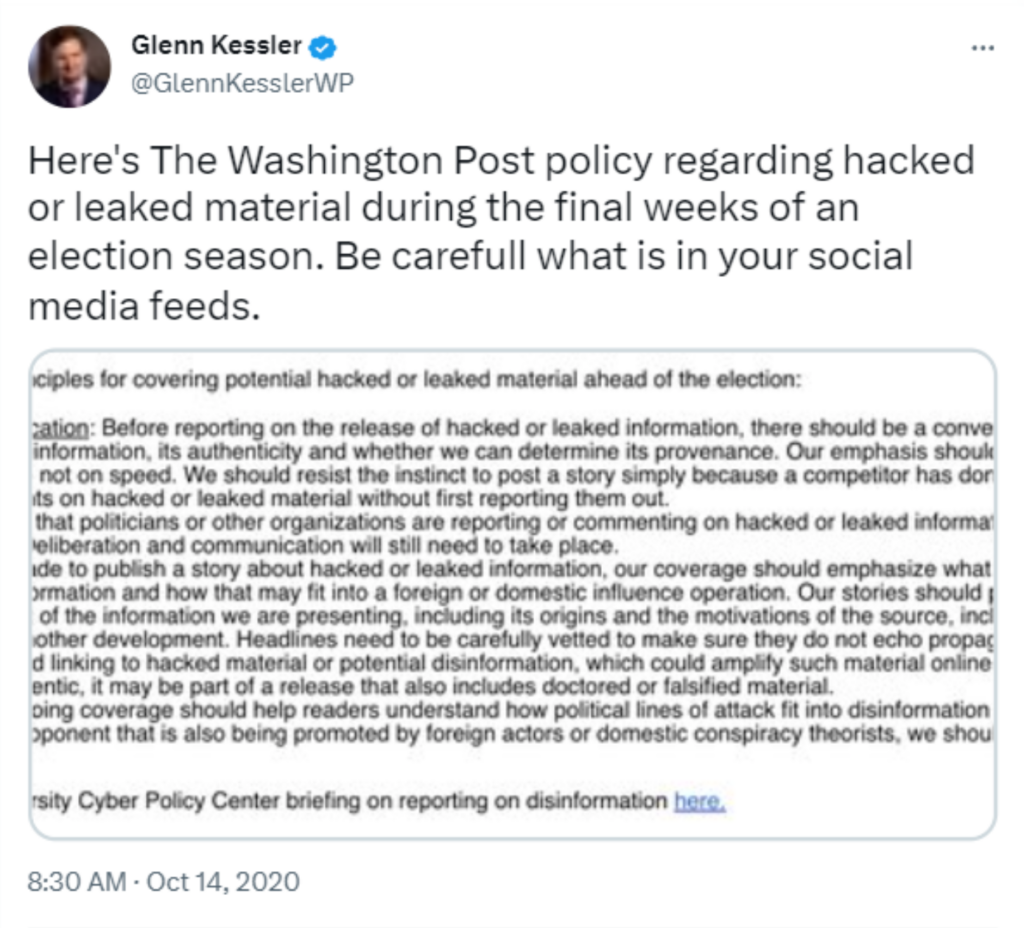
Mother Jones’ D.C. bureau chief David Corn followed with a 9:07 tweet declaring that the “whole story” was predicated on “false Fox/Giuliani talking points” and pronouncing the Post as advancing “disinformation.”
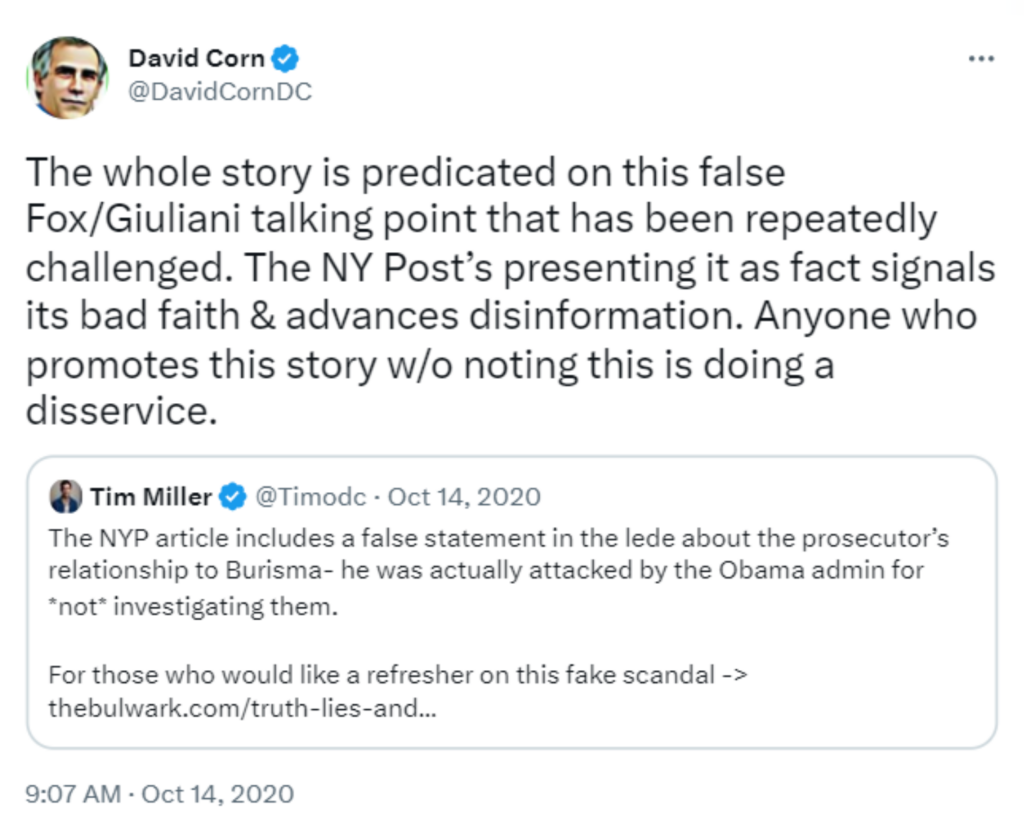
Twitter’s decision to censor the Hunter Biden story was bad enough before, but to think the executives may have relied on so-called experts like these raises the outrage another octave.
Former Twitter Deputy General Counsel James Baker likewise indicated in an email that he had “seen some reliable cybersecurity folks question the authenticity of the emails in another way (i.e., that there is no metadata pertaining to them that has been released and the formatting looks like they could be complete fabrications.)” Baker, however, did not say whether he had spoken with the “cybersecurity folks,” and given that when pushed by the committee he hid behind attorney-client privilege, getting any more answers from Baker seems unlikely.

Beyond learning that Twitter executives opted to rely on the tweets of so-called experts over asking the FBI if the laptop was fake, Wednesday’s hearing consisted mainly of grandstanding — some on both sides of the aisle — and Democrats attempting to make the hearing about Trump when they weren’t complaining that the entire session was a waste of time. One additional salient fact came out, however, in addition to a review of the basics of Twitter’s censorship efforts.
Specifically, Roth clarified for the House committee that the FBI had not previously warned that an expected “hack-and-leak” operation was rumored to likely involve Hunter Biden. Rather, according to Roth’s testimony, the rumor that the hack-and-leak operation would target the Biden son came from another tech company.
Roth claimed in his Wednesday testimony that his Dec. 21, 2020, statement to the Federal Election Commission was being misinterpreted. In that statement, Roth had attested that “since 2018 he had regular meetings with the Office of the Director of National Intelligence, the Department of Homeland Security, the FBI, and industry peers regarding election security.” His signed declaration then noted that the “expectations of hack-and-leak operations were discussed throughout 2020. I also learned in these meetings that there were rumors that a hack-and-leak operation would involve Hunter Biden.”
According to Roth, he should have worded his statement differently because it was not the FBI that had raised Hunter Biden as a potential subject of the hack and leak, but a peer company. One would think, however, that Roth would have clarified this point to his lawyer some two-plus years ago when Twitter’s Covington & Burling attorney represented to the FEC in a cover letter that accompanied Roth’s statement that “reports from the law enforcement agencies even suggested there were rumors that such a hack-and-leak operation would be related to Hunter Biden.”
Clearly, the former Twitter executives seek to separate themselves from the FBI, but “The Twitter Files” make that next to impossible to accomplish. And, really, being beholden to the so-called experts tweeting out warnings of supposed Russian disinformation would hardly be an improvement.

